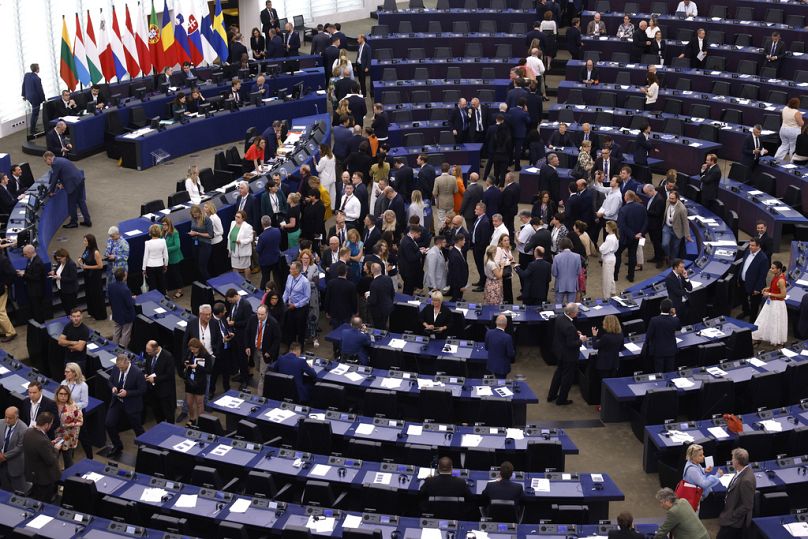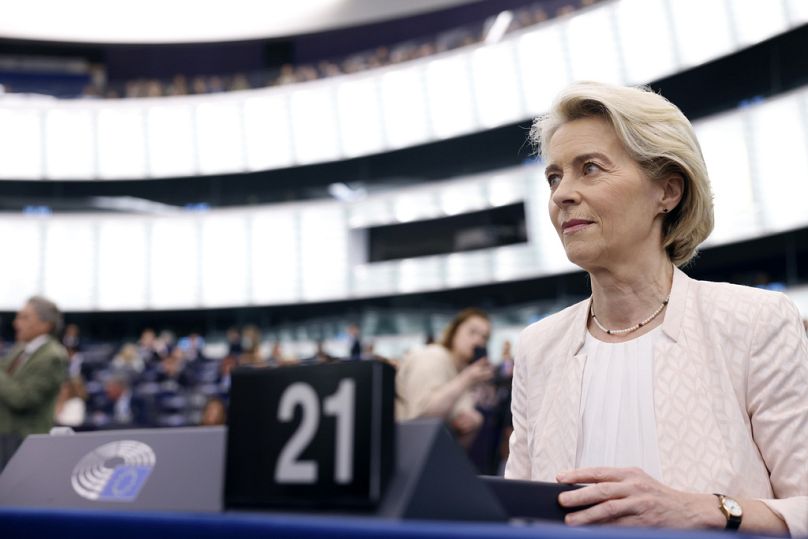Right now, by drawing a red line against any future deals with the far right, President von der Leyen can make one of the most decisive steps to ensure the EU stands firm for all Europeans, Barbara Skrobol writes.
Izabela Sajbor, my sister-in-law, was just 30 years old when, at 22 weeks pregnant, she found herself in a hospital bed.
Surrounded by doctors who refused to act due to the stringent abortion laws enacted under the far-right Law and Justice (PiS) government, Izabela died from septic shock 24 hours later, leaving behind a 9-year-old daughter and a grieving family. She is believed to be the first known victim of Poland's abortion ban.
Izabela’s death sparked protests across Poland against the misogynist laws of the PiS government under the slogan “Not a single woman more”.
The official investigation blamed medical malpractice. Which is partly true — there were medical errors.
But most of all, I believe that the change in abortion law influenced the doctors' decision, ultimately leading to my sister-in-law’s death.
This tragedy is a reminder of the dangers posed by far-right politics, which prioritise ideology over human life, of the ways the political becomes personal.
We came to Brussels to share our stories
Our story is not unique. Across Europe, wherever the far right gets into power, we see attacks on families, wars on women, and the shredding of personal freedoms and choices.
The makeup of the new European Parliament will worry people across Europe who traditionally bear the brunt of far-right power.
As Euronews put it, the new Parliament is “more right wing, with fewer women”. New hard-right groupings include Viktor Orban’s and Marine Le Pen’s Patriots for Europe with 84 seats and the AfD-led Europe of Sovereign Nations with 25 seats may not have seized control, but they will now have enough traction to make it all too tempting to make deals with them.
But normalising these parties would be a huge mistake for a Europe that is attempting to lead the world as a model of liberal democracy.
A recent delegation to Brussels of victims of the far right, in which I took part, came to warn centre and left parties not to cosy up to the ultra-right. We all had our stories to tell.
In Hungary, a children's book editor witnessed far-right MPs tearing up pages at a press conference, reminiscent of Nazi book burnings. Orbán's government later banned the depiction of gay people in educational materials and TV shows for under-18s, a move condemned as a violation of children's rights.
In Italy, two lesbian mothers face a legal battle to keep both their names on their child's birth certificate, following Prime Minister Giorgia Meloni's directive to stop registering same-sex parents' children. If they lose, one mother could lose her parental rights overnight, a heartbreaking prospect for any family.
And then there was the tragedy of my sister-in-law.
It's people who bear the scars of governance
These stories expose the ugly face of the far-right, and they are why I have joined a group of survivors from different countries to warn politicians and people alike of how dangerous they are.
Our group is diverse — but each of us bears the scars of far-right governance. We include LGBTQ+ individuals who have been attacked for who we love or who we are, parents who fear losing the right to parent their children together, and an editor fighting for free speech.
First and foremost, we are just ordinary people who want to live our lives and love our families. But every day is a fight because of the far right.
Although von der Leyen has so far avoided any alliances with the far right, there is still a danger. Analysis has shown that, including the centre-right EPP, every committee in the European Parliament will have a right-wing majority (except for the Committee on Women).
This is significant. Committees have a huge influence. And the temptation for the EPP and Meloni’s ECR may well be to align with the harder right on upcoming issues where their views align.
Lived realities of countless others across Europe
The simple fact is the far right offers false solutions to the real problems facing Europeans — problems such as rising food prices, housing shortages, and failing public services.
Instead, they thrive on division and scapegoating. They will erode our freedoms, attack our families, and undermine democracy. These are not abstract fears; they are the lived realities of people like me, my family, and countless others across Europe.
Right now, by drawing a red line against any future deals with the far right, President von der Leyen can make one of the most decisive steps to ensure the EU stands firm for all Europeans.
Let Izabela's tragic death not be in vain. Not one more life should be lost to the cruel and oppressive policies of the far-right. Stand with us, and together, we can safeguard the future of Europe for all its citizens.
Barbara Skrobol is the sister-in-law of Izabela Sajbor, the first known victim of the de facto abortion ban in Poland.
At Euronews, we believe all views matter. Contact us at view@euronews.com to send pitches or submissions and be part of the conversation.













